Is there a franchise more remarkable than Mission: Impossible? It began in 1996, with director Brian De Palma at the helm, constructing a spy film that trafficked in complicated conspiracies and paranoia and felt like a high-tech homage to 1970s thrillers. Now, six films in, the franchise shows no signs of fatigue or drop in quality. The films have shifted away from dark rooms of schemers to glitzy, death-defying stunts and spectacle, but they've remained thrilling exercises in spectacle. How many film series can claim such a feat?
Mission: Impossible- Fallout opens with Ethan Hunt (Tom Cruise, willing to risk life and limb for the sake of our entertainment repeatedly) on a beach, wedding Julia Meade (Michelle Monaghan), a character first introduced in Mission: Impossible 3 and briefly glimpsed in its sequel. However, that idyllic scene quickly becomes a nuclear-drenched nightmare from which Ethan Hunt awakes.

It's a fitting opening for Fallout, as both this scene and the film's subtitle tell us this is to be a story about dealing with consequences of actions undertaken and decisions made in previous films, as well as an attempt to establish a narrative through-line across the franchise's previous films. Multiple references, for example, are made to the iconic "should you choose to accept it" part of the recurring self-destruct messages that reminds Hunt of his mission at the start of every movie. Here, the choices are unavoidable and from their ashes rise the titular fallout.
The film's primary focus involves plutonium, stolen from Hunt and his team when he refuses to sacrifice an individual for the greater good. His team has dwindled slightly. Gone is Jeremy Renner's William Brandt but the stoic Luther (Ving Rhames) and the fidgety, nervous Benji (Simon Pegg) remain.
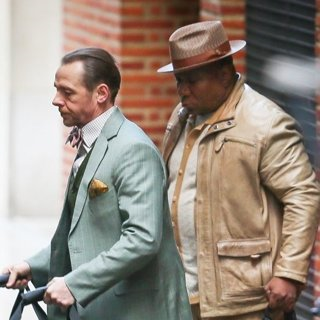
Because of Hunt's refusal to sacrifice a member of his team, the CIA director (Angela Bassett, having quite the career year) pairs Henry Walker (a well-cast Henry Cavill) with Hunt.
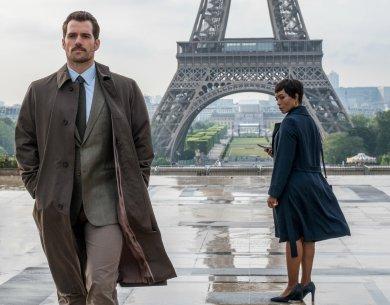
Walker is a character who has no time for planning or strategy, preferring to testosterone his way through a conflict in contrast to Hunt's analytical style. The hope is they can retrieve the stolen plutonium before The Apostles, a fragment of the Syndicate, the shady organization introduced in a previous film, can use it to create nuclear weapons. Also returning is MI6 agent Ilsa Faust (a fantastic Rebecca Ferguson), back with another devil's bargain that keeps her last name an appropriate one.
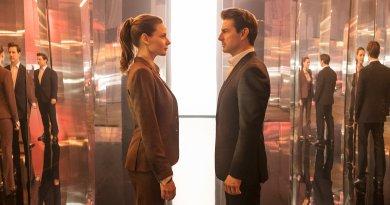
If the film's plot, which also features a black market arms dealer known as the White Widow (Vanessa Kirby) and Solomon Lane (Sean Harris) who was last seen being gassed into unconsciousness and taken into custody, sounds too dense, fret not. Christopher McQuarrie, the first director and screenwriter to return to the franchise, keeps the action moving at a brisk pace. The fight sequences are staged like ever-expanding ripples, beginning with an intimate, brutal fistfight in a Paris nightclub restroom and cycling out to include extensive chases through European streets and airborne intrigue.
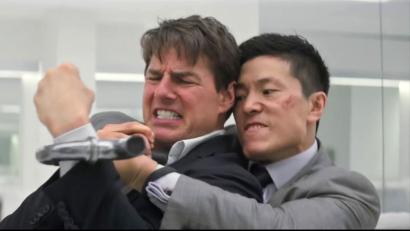
McQuarrie has a fine eye for well-staged action sequences and jaw-dropping, eye-dazzling spectacle, but he's also a gifted screenwriter. He breaks up his stunts and spectacle with punchy, sharp dialogue. He allows the film's action pageantry to breathe by intercutting with dialogue that alternates between humorous one-liners (often supplied by Pegg's Benji) and heavier discussions about political philosophies and individual morality. I've loved almost every film in this franchise, save for John Wu's Mission: Impossible 2, but Brad Bird's Ghost Protocol will probably always rank as my favorite. However, McQuarrie has taken this second time at the series' helm to construct Fallout as a thematically rich, visually dazzling companion piece to his prior Rogue Nation.
However, as much as these films are vehicles for breath-taking actions sequences and elaborate double and triple crosses, the franchise's linchpin remains Tom Cruise's Ethan Hunt. Cruise's face is weathered, but still appears younger than his 56 years, and his willingness to put himself in harm's way for the sake of stunt one-upmanship grounds the spectacle in verisimilitude. In addition, unlike The Mummy, Cruise's most recent summer outing, Fallout appears comfortable at least slightly acknowledging Cruise's aging. He's slightly winded by that bathroom fight scene and frequently finds himself staring in frustration as the broader-shouldered, younger Cavill (amazing mustache and all) charges his way through a conflict.
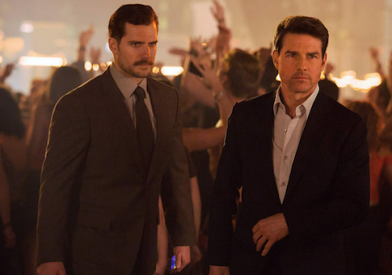
Don't get me wrong. Cruise is still the film's most valuable asset. He runs faster and longer than anyone should ever be able to do and leaps across buildings in a way that nearly defies physics.
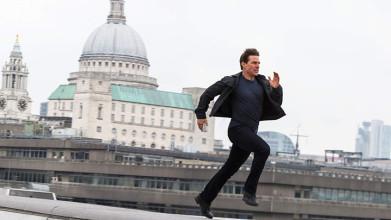
Honestly, if he began to run across water, it would hardly be surprising. However, the film acknowledges that he's a character who's perhaps seen too much and made too many hard choices to ever accept another defeat. A vulnerability creeps through Cruise's performance that undercuts his apparent immortality. All of the film's performances are strong, but this is still Cruise's show and he fully commits to making Hunt a compelling protagonist.
There's something about Fallout that feels like a finale, as though a loop that began over two decades ago is finally being closed. I hope that's not the case, but if I never find myself in Ethan Hunt's capable hands, I could hardly ask for a better swan song. To have kept an action movie franchise thriving for as long as this franchise has done feels like its own impossible mission, but I'm glad that mission was accepted.

